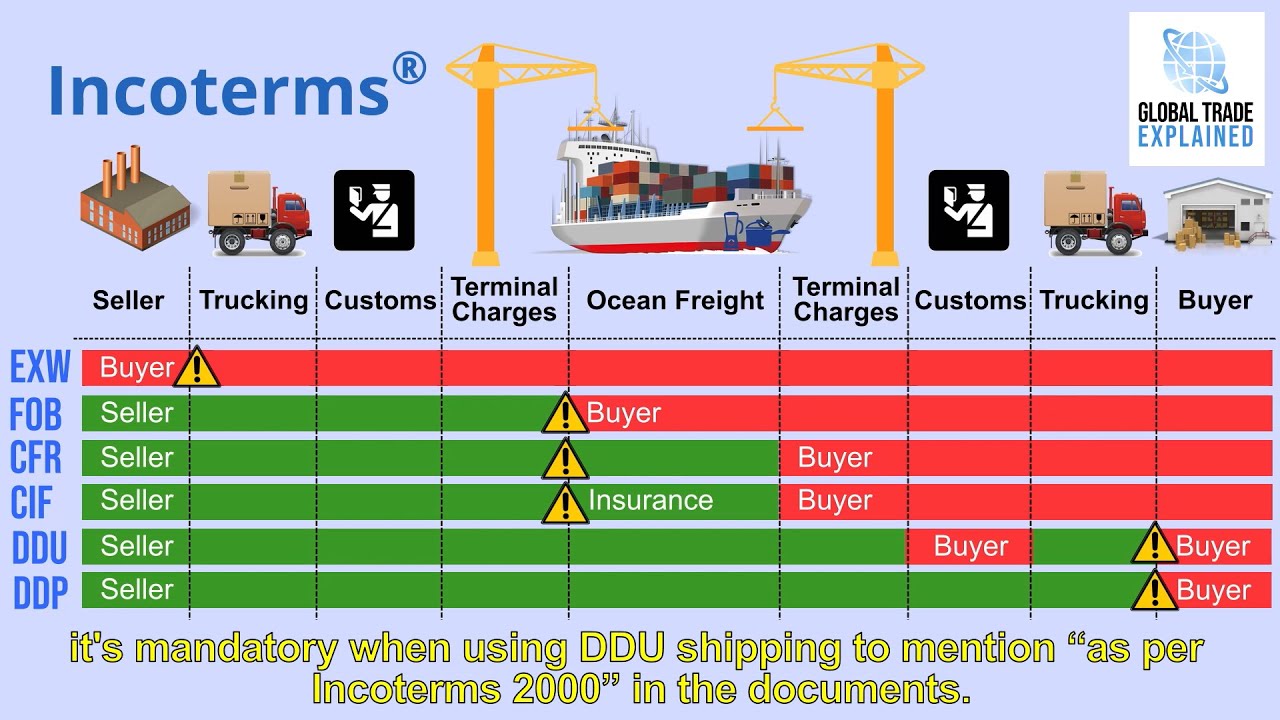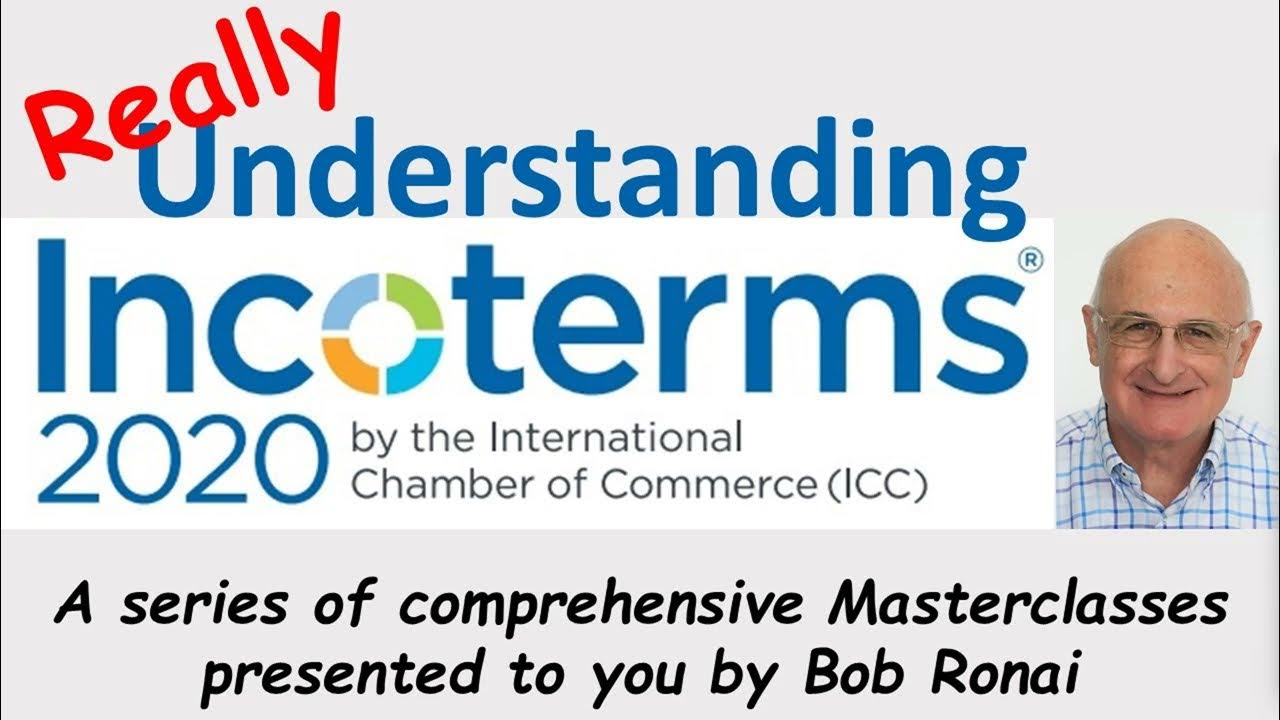Incoterms (International commercial Terms) 2020 #1 Ekspor Impor
Summary
TLDRThis video explains the concept of Incoterms 2020, a set of international trade terms used to standardize the responsibilities, risks, and costs between buyers and sellers. It covers the core principles of Incoterms, such as delivery obligations, risk transfer, and cost allocation. The video also highlights different rules for various modes of transport, both sea and multimodal, and how terms have evolved over the years, starting from 1936. The aim is to create uniformity in international trade to prevent misunderstandings and ensure smoother transactions between exporters and importers across different countries.
Takeaways
- 😀 Incoterms 2020 standardizes international trade practices, defining the roles and responsibilities of buyers and sellers.
- 😀 Incoterms are a set of internationally recognized terms that specify who is responsible for various costs, risks, and tasks in international trade.
- 😀 The purpose of Incoterms is to avoid misunderstandings and misinterpretations in international trade by providing clarity on the transfer of obligations.
- 😀 Key obligations in Incoterms include who handles transportation, insurance, shipping documents, and import/export clearance.
- 😀 Incoterms 2020 has evolved from its origins in 1936 and has been updated periodically to address new transportation methods and practices.
- 😀 The primary elements of Incoterms involve the transfer of goods, risk, and cost, as well as the specific delivery points.
- 😀 Incoterms do not govern pricing or payment terms, ownership of goods, or intellectual property rights like trademarks or patents.
- 😀 There are two main categories of Incoterms: one for multiple modes of transport and one specifically for sea or inland waterway transport.
- 😀 Common Incoterms for multiple transport modes include EXW (Ex Works), FCA (Free Carrier), and DDP (Delivered Duty Paid), each with different responsibilities for the seller and buyer.
- 😀 For sea transport, key terms like FOB (Free On Board), CFR (Cost and Freight), and CIF (Cost, Insurance, and Freight) define the point where risk and responsibility transfer from the seller to the buyer.
Q & A
What are Incoterms?
-Incoterms (International Commercial Terms) are a set of internationally recognized rules that define the responsibilities of buyers and sellers in international trade. They focus on the delivery of goods, transfer of risk, and distribution of costs between parties.
Why are Incoterms important in international trade?
-Incoterms are essential because they create a common understanding between buyers and sellers in different countries, reducing the risk of misunderstandings, misinterpretations, and disputes related to the transfer of goods and associated responsibilities.
How do Incoterms define the transfer of risk in a transaction?
-Incoterms define the transfer of risk at a specific point during the transaction, such as when the goods are delivered, loaded onto a transport vessel, or reach a specific destination. This ensures both parties understand when responsibility for potential damage or loss shifts from seller to buyer.
What does the term 'Ex Works' (EXW) mean in Incoterms?
-Ex Works (EXW) means that the seller delivers goods at their premises or another agreed-upon location. The buyer takes on the responsibility of transportation, risks, costs, and any necessary customs procedures from the seller's location.
What is the difference between 'FOB' and 'CFR' Incoterms?
-FOB (Free on Board) means the seller is responsible for delivering the goods onto the ship at the port of origin. After that, the risk shifts to the buyer. In contrast, CFR (Cost and Freight) means the seller pays for shipping to the destination port, but the risk is transferred to the buyer once the goods are loaded onto the ship.
How have Incoterms evolved over time?
-Incoterms have evolved since their creation in 1936. Initially focused on marine transport, they have expanded to include air, road, and multi-modal transport. Key revisions occurred in 1953, 1967, 1980, 1990, 2000, 2010, and most recently in 2020, adapting to changes in global trade.
What is the primary goal of Incoterms?
-The primary goal of Incoterms is to standardize international trade terms to avoid confusion, misinterpretation, and disputes over delivery, risk, and costs, ensuring clarity between buyers and sellers from different countries.
What is not covered by Incoterms?
-Incoterms do not cover price or payment terms, ownership transfer of goods, intellectual property rights, or national laws and regulations. These are considered separate agreements outside of the scope of Incoterms.
What are the two main categories of Incoterms?
-The two main categories of Incoterms are: 1) Rules for any mode of transport, which apply when multiple transport modes are used (e.g., air, road, sea), and 2) Rules for sea and inland waterway transport, which apply specifically to waterborne transportation.
What does 'CIF' mean in Incoterms, and how does it differ from 'CFR'?
-'CIF' (Cost, Insurance, and Freight) means the seller pays for shipping and insurance to the destination port, providing coverage for the goods during transit. Unlike 'CFR' (Cost and Freight), which does not require the seller to provide insurance, 'CIF' mandates that the seller covers insurance costs for the buyer.
Outlines

This section is available to paid users only. Please upgrade to access this part.
Upgrade NowMindmap

This section is available to paid users only. Please upgrade to access this part.
Upgrade NowKeywords

This section is available to paid users only. Please upgrade to access this part.
Upgrade NowHighlights

This section is available to paid users only. Please upgrade to access this part.
Upgrade NowTranscripts

This section is available to paid users only. Please upgrade to access this part.
Upgrade NowBrowse More Related Video
5.0 / 5 (0 votes)





